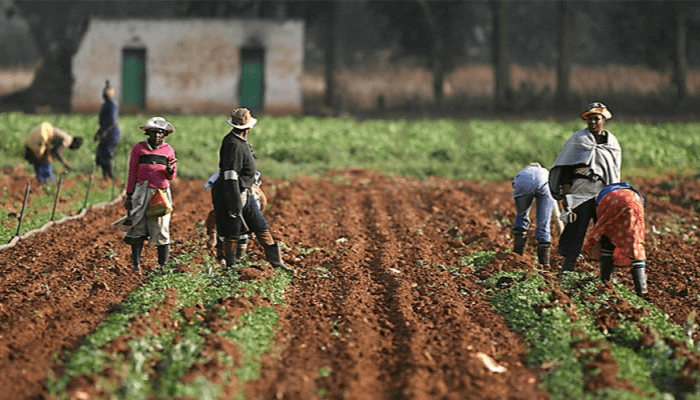Despite an increase in the number of farmers, production levels of some essential crops in Nigeria is expected to experience a varied trend with possible decrease in the 2023/2024 marketing year.
Although in the year 2022, food production index saw an increase, reaching 119.9 index points and even though experts said that this growth was modest, it was attributed to Nigerian farmers who despite several challenges, demonstrated resilience to flood and insecurity.
Latest available data from various sources, including the United States Department of Agriculture (USDA) and Statista projected a slight decrease in production of rice in Nigeria from 5,355 million metric tonnes in the previous 2022/23 period to around 5, 229 million metric tonnes for 2023/24 marketing year.
For crop like maize, production was 12, 75 million metric tonnes in 2021 and is projected to decrease by 8 per cent to 11, 0 million metric tonnes in the marketing year 2024/25.
While Guinea Corn (Sorghum) production was 6, 742 million metric tonnes in 2022/23 and is expected to decline to around 6, 700 million metric tonnes for 2023/24.
Peanut will increase to 4, 300 metric tonnes in the 2024 projection from the 4,284 metric tonnes in 2022.
For millet, there is decline in the projection of of 2, 000 metric tonnes from the 2, 030 metric tonnes in the previous year.
Palm oil is also expected to increase to 1,500 metric tonnes in 2024 from the 1, 400 metric tonnes in the 2022. While soybeans will slightly declined to 1, 150 metric tonnes from the, 080 metric tonnes in 2022.
According to the Food and Agriculture Organisation (FAO) of the United Nations over 31.5 million people in Nigeria are projected to face acute food insecurity between June and August 2024.
The latest data represent a significant increase of about 4.6 million people from the 26.5 million earlier projected in November, 2023 for the period.
The world food agency in its Cadre Harmonise report released in March, said that Nigeria has been grappling with multiple security challenges which has affected food production and access.
According to the report, several other factors contributed to the alarming food insecurity, including conflicts in the North-east, north central and north-west, fuel scarcity, naira devaluation, currency crisis, rising inflation and consumer price index.
Even as planting season begins, farmers in Nigeria may likely face decline in crop production this year due to the persistency of these challenges.
National president of the All Farmers Association of Nigeria (AFAN), Kabir Ibrahim, has voiced concerns over these challenges and the current state agricultural sector.
According to Ibrahim, this decrease is attributed to a myriad of challenges that include insecurity, low levels of mechanisation, soaring costs of inputs, flooding, and heightened labour expenses.
The farmers’ leader said that these factors have collectively impeded the productivity of Nigerian farmers.
In response to these adversities, Ibrahim added that AFAN is taking a proactive stance by treating agriculture as a business and engaging in advocacy with the government.
The association is calling on President Bola to implement sustainable subsidies for all agricultural inputs and to bolster security measures, thereby ensuring farmers can safely access their lands.
Although farmers seems to gear up for the current farming season with optimism, hoping for the timely delivery of interventions promised by the government at various levels.
These interventions according to AFAN are crucial for overcoming the obstacles faced by the agricultural community and for the potential increase in production of the aforementioned crops.
He said, “Surprisingly there more farmers today but an increasing number of challenges to productivity so the measurable production shows a decline in terms of what is available in the market.
“The decrease is due to the various threat factors such as insecurity, low mechanisation, cost of inputs, flooding and increased labor costs.”
He continued, “As some efforts are underway from various windows such as NAGS-AP, Sustain Africa Initiative and the emergency on food security by Mr Presidrnt as well as the seeming change in attitude by the sub-national, I foresee a possible increase in production of the commodities.
“We are working assiduously and remaining focused on doing Agriculture as a business. We are doing advocacy to government and appealing to Mr President to grant sustainable subsidy on all inputs as well as provide adequate security to enable the farmers greater access to their farms.
“We are doing our best and looking forward to the promised interventions by the various governments at all levels.”





